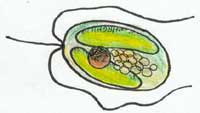Golden Alga

Golden Alga, Prymnesium parvum
Drawing by Robert G. Howells, TPWD
What Is It?
Golden alga (Prymnesium parvum) is a single-celled organism that lives in water. It occurs worldwide, primarily in coastal waters, but it's also found in rivers and lakes. It doesn't always cause problems, but when it "blooms" (enters a phase of rapid growth and reproduction) this alga can produce toxins that cause fish kills. The toxins affect organisms that have gills: all types of fish, freshwater mussels and clams, and the gill-breathing juvenile stage of frogs and other amphibians. Read more about the biology of golden alga.
There is no evidence that golden alga toxins pose a direct threat to humans, other mammals, or birds. Still, people should avoid picking up dead or dying fish for consumption.

Dying shad and discolored water at Lake Granbury
TPWD Photo by Joan Glass
Where and When Does It Occur?
Recent blooms | History of blooms in Texas
In Texas, golden alga-related fish kills have occurred in inland waters with high salt or mineral content, usually west of I-35. The first confirmed case was in 1985 on the Pecos River in the Rio Grande Basin. Since then, golden alga has been responsible for multiple fish kills in five river basins. In 2001, a bloom at the Dundee State Fish Hatchery destroyed a whole season's production of striped and hybrid striped bass. More than 20 other states have reported blooms in recent years.
A golden alga fish kill may last for days, weeks, or months. Sometimes only a portion of a lake is affected, but the location can change from one day to the next. Blooms are more likely to occur in cold weather, and sometimes taper off as the water warms and other species of algae become more active — but not always. An extended kill can have long-term effects on a fishery and cause economic hardship for parks and businesses that serve recreational anglers.
What Can Be Done About It?
Following a series of severe fish kills in 2001, Texas Parks and Wildlife Department formed a Golden Alga Task Force. Through 2010, the task force worked with scientists and stakeholders from the United States and other countries, exploring strategies to avoid, minimize, and mitigate the effects of golden alga. Despite significant efforts by TPWD and our international network of partners, golden alga bloom dynamics and toxin formation are still not well understood. Some treatments have proved effective for ponds and small reservoirs, but to date there is no feasible way to control golden alga in large reservoirs and rivers. Read more about golden alga research and management.
- Report Kills - If you see a fish kill or suspect golden alga, contact TPWD's 24-hour communications centers at 512-389-4848 (Austin).
- Get the Facts - TPWD has collaborated with the Texas Commission on Environmental Quality and other entities to produce a golden alga information card. Download a PDF from the TCEQ website or request a free hard copy from TPWD at hab@tpwd.texas.gov.